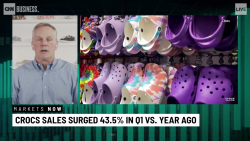Asos is having a nightmare holiday season.
Shares in the UK online fashion retailer plunged 40% on Monday after it warned that weak sales in the crucial month of November would harm its annual profit for 2018.
“The current backdrop of economic uncertainty across many of our major markets together with a weakening in consumer confidence has led to the weakest growth in online clothing sales in recent years,” it said in a statement.
Asos (ASOMY) was considered one of the few retail bright spots in the United Kingdom, where many sellers have struggled with the transition to online shopping and an economic slowdown caused by uncertainty about Brexit.
The profit warning at Asos, which wiped more than $1 billion off its market value, shows that even savvy online retailers could struggle this holiday season.
“This is a potential warning sign for online retailers who have hitherto held up relatively well compared to traditional [Main Street] chains,” David Cheetham, chief market analyst at online broker XTB, said in a note to clients.
Asos said Monday that conditions in major European markets such as Germany and France were “significantly more challenging.” But it was also hard hit in Britain, where the Brexit saga has unnerved investors and the public.
Some 80,000 British retail jobs disappeared in the first half of the year, according to the Office for National Statistics. Official data on UK retail sales in November will be published on Thursday.
Asos, which sells hundreds of brands as well as its own fashion lines, said it was facing a “high level of discounting” and promotional activity from competitors in the United Kingdom. It also said consumer confidence in the country was “increasingly fragile.”
The retailer said it was still outperforming UK competitors, but only because it’s offering more discounts than planned.
Michelle Wilson, an analyst at Berenberg bank, said its reliance on discounts indicates “poor conditions in the retail market” and “a weak consumer.”
Asos also misjudged its strategy on Black Friday, according to Wilson, offering discounts that fell short of the competition.
CEO Nick Beighton acknowledged during a conference call with analysts on Monday that the Black Friday offer “wasn’t strong enough.”

























